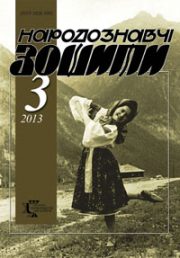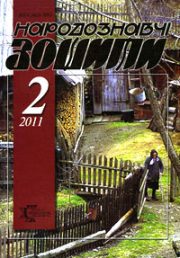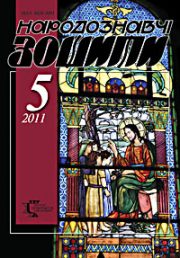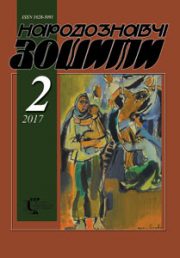The Ethnology Notebooks. 2024. № 4 (178), 854—864
UDK 930.2:[305-055.2:070.447](47+57)”1970/1980″
DOI https://doi.org/10.15407/nz2024.04.854
THE SOCIOCULTURAL CONSTRUCT OF FEMININITY IN THE PUBLIC DISCOURSE OF THE USSR (1970S—1980S)
OMELIUKH Iryna
- ORCID ID: https://orcid.org/0009-0008-7666-9030
- Graduate Student,
- Ivan Franko National University of Lviv,
- Department of History of Central and Eastern Europe,
- 1, Universytetska str., 79000, Lviv, Ukraine,
- Contacts: e-mail: ir98omeliukh@gmail.com
Abstract. Introduction.The concept of femininity in the public discourse of the USSR in the 1970s and 1980s did not have an unambiguous official interpretation and was not enshrined in any normative document, but was often circulated in mass and popular science literature that shaped and reflected the official discourse.
Statement of the problem.The ideas about women and femininity that prevail in society are typically associated with traditional stereotypes of femininity, based on established cultural ideas about gender, in complete opposition to traditional masculinity, which often leads to excessive simplifications and generalizations in the interpretation of the concept of femininity.
The purpose of the article is to show the creation of the concept of femininity in the official Soviet discourse of the 1970s and 1980s and the prevailing ideas about women and women’s identity.
The methodological basis is the principles of historicism, determinism, systematicity, systematization, and generalization.
Results. The revitalization of discussions about the role and status of women in society, which took place in the public sphere in the 1970s and 1980s, had a significant impact on the understanding of femininity in Soviet discourse. The growth of related topics in specialized pedagogical, psychological, and medical literature, as well as in the popular press, has shown an increased interest in the problem of femininity. However, the excessive simplifications and generalizations that characterize texts by Soviet authors have led to a rather one-sided interpretation of femininity, linked to traditional gender stereotypes and social expectations. The views of Soviet scientists were obviously shaped by the dominant party ideology, but their observations and conclusions on femininity also reflected the position of biological determinism.
Conclusions. Looking at femininity through the lens of biological determinism, Soviet scholars found many arguments in favor of one of the main ideological attitudes to femininity — the thesis of a woman’s «natural purpose». This «natural purpose» was motherhood and family. In general, the concept of femininity in the Soviet discourse was understood as a set of properties associated with female physiology, psyche, and behavior that were considered naturally determined and completely opposed to traditional masculinity, or male physiology, psyche, and behavior.
Keywords: femininity, concept of femininity, biological determinism, public discourse, USSR, 1970s—1980s.
Received 7.07.2024
REFERENCES
- Gradskova, Y. (2007). Soviet People with Female Bodies: Performing Beauty and Maternity in Soviet Russia in the mid 1930—1960s. Stockholm: Stockholm University. DOI: https://doi.org/10.1353/imp.2010.0013
- Attwood, L. (1990). The new Soviet man and woman: sex-role socialization in the USSR. Bloomington: Indiana University Press. DOI: https://doi.org/10.1007/978-1-349-21030-5
- Stiazhkina, O. (2001). «Soviet woman» and «lyrical heroine»: creation of stereotypes in ukrainian literature of the 50s—90s. Naukovi pratsi NaUKMA. Seriia Istorychni nauky, 10, 142—147 [in Ukrainian].
- Mamych, M. (2018). Gender stereotypes in periodical magazines for women (based on publication «Soviet woman»/«Woman»). International Humanitarian University Herald. Philology, 32 (3), 77—80 [in Ukrainian].
- Smolnytska, M. (2011). Woman in the Soviet society: the official image and real practice. Ukraine of the twentieth century: culture, ideology, politics, 16, 162—174 [in Ukrainian].
- Bilodid, I. (Ed.) (1971). The dictionary of the Ukrainian language: in 11 vol. (Vol. 2: H—Zh). Kyiv: Naukova dumka [in Ukrainian].
- Ozhegov, S., & Shvedova, N. (Ed.). (1992). Explanatory Dictionary of the Russian Language. Retrieved from: https://royallib.com/read/ogegov_sergey/tolkoviy_slovar_russkogo_yazika.html#0 (Last accessed 17.06.2024) [in Russian].
- Oxford English Dictionary. Femininity (n.). Retrieved from: https://www.oed.com/dictionary/femininity_n?tab= meaning_and_use&tl=true#221533954 (Last accessed 17.06.2024).
- Cambridge Dictionary. Femininity (n.) Retrieved from: Retrieved from: https://dictionary.cambridge.org/uk/dictionary/english/femininity (Last accessed 17.06.2024).
- Sukhomlynska, O. (2014). Soviet pedagogy as an ideology: an attempt at historical reconstruction. History of Education Almanac, 1, 4—24 [in Ukrainian].
- Shevchenko, Z. Biodeterminism. Dictionary of gender terms. Retrieved from: http://a-z-gender.net/ua/biodeterminizm.html (Last accessed 06.05.2024).
- Males, L. (2004). Biological, psychological and socio-cultural factors of gender. In: Gender Basic Course (Pp. 108—130). Kyiv: K.I.S. [in Ukrainian].
- Razumihina, L. (1986). The World of Family. Moscow: Prosveshchenie [in Russian].
- Timoshchenko, L. (1983). Education of high school girls. Moscow: Prosveshchenie [in Russian].
- Khripkova A., & Kolesov D. (1981). Girl — Teenager — Young Woman. Moscow: Prosveshchenie [in Russian].
- Yunda I., Skripkin Y., & Maryasis E. (1985). Let’s talk frankly. Moscow: Znanie [in Russian].
- Kuznetsova, L. (1980). Woman at work and at home. Moscow: Politizdat. Retrieved from: https://a-z.ru/women/texts/gnarab1-4.htm (Last accessed 03.05.2024) [in Russian].
- Timoshchenko, L. (1978). A daughter is growing up in the family. Moscow: Znanie [in Russian].
- Zalyhin, S. (1986). Woman and the NTR. Radianska zhinka, 11, 8—11 [in Ukrainian].
- (1941, 21.11). On the tax on bachelors, single persons, and childless citizens of the USSR. Decree of the Presidium of the Supreme Soviet of the USSR. Bulletin of the Supreme Soviet of the USSR, 42 (Last accessed: 14.05.2024) [in Russian].
- Ezhov, A. (Ed.) (1970). Women in the USSR. Herald of Statistics: an organ of the Central Statistical Office of the USSR. Moscow: Statistika [in Russian].
- (1971, 10.12). Article 174. Jobs where the use of women’s labor is prohibited. The Labor Code of the Ukrainian SSR, 322—VIII. Retrieved from: https://ips.ligazakon.net/document/view/kd0001?an=901613&ed=1991_03_20 (Last accessed: 14.05.2024) [in Ukrainian].
- (1971, 10.12). Article 175. Restrictions on women’s work at night. The Labor Code of the Ukrainian SSR, 322—VIII. Retrieved from: https://ips.ligazakon.net/document/view/kd0001?an=901613&ed=1991_03_20» (Last accessed: 14.05.2024) [in Ukrainian].
- (1978, 25.07). On approval of the list of industries, professions and works with difficult and harmful working conditions, where the use of women’s labour is prohibited. Resolution of the USSR State Committee for Labour, 240; Presidium of the All-Union Central Council of Trade Unions, P10-3 (as amended on 22.10.1990). Retrieved from: https://docs.cntd.ru/document/9039453 (Last accessed: 14.05.2024) [in Russian].
- (1969, 20.06). Article 5. State protection of the family. Protection and promotion of motherhood. The Code on Marriage and Family of Ukraine, 2006-VII. Retrieved from: https://ips.ligazakon.net/document/view/kd0004?an= 1&ed=2004_01_01 (Last accessed: 14.05.2024) [in Ukrainian].
- Tkachek, Z. (1972). About the purpose of life. Radianska zhinka, 9, 28—29 [in Russian].
- Mihajlova, T. (1968). In debt to the future. Rabotnitsa, 12, 17 [in Russian].
- Khodakov, N. (1971). To young spouses. Moscow: Medicina [in Russian].
- Afanasyeva, T. (1988). Family. Moscow: Prosveshchenie [in Russian].
- Kolomiets, A. (1988). Business woman: self-portrait and portrait composed of two monologues. Radianska zhinka, 3, 10—11 [in Ukrainian].







